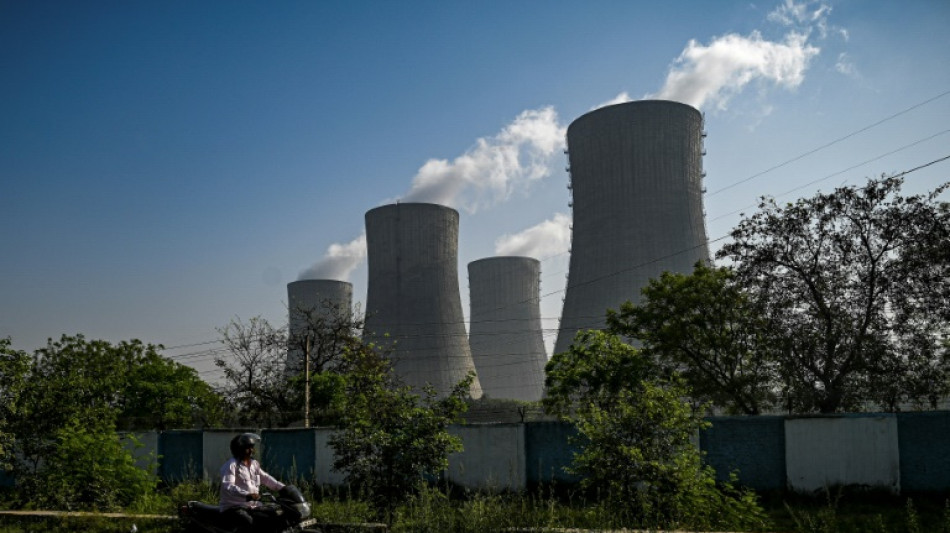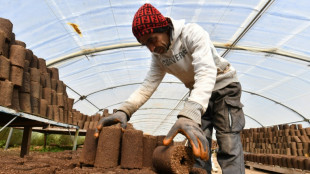
-
 Saka 'ready to go' after long injury lay-off: Arteta
Saka 'ready to go' after long injury lay-off: Arteta
-
Ingebrigtsen Sr, on trial for abusing Olympic champion, says he was 'overly protective'

-
 Tourists and locals enjoy 'ephemeral' Tokyo cherry blossoms
Tourists and locals enjoy 'ephemeral' Tokyo cherry blossoms
-
Khamenei warns of 'strong' response if Iran attacked

-
 France fines Apple 150 million euros over privacy feature
France fines Apple 150 million euros over privacy feature
-
UK PM urges nations to smash migrant smuggling gangs 'once and for all'

-
 Thai authorities probe collapse at quake-hit construction site
Thai authorities probe collapse at quake-hit construction site
-
France's Le Pen convicted in fake jobs trial

-
 Chinese tech giant Huawei says profits fell 28% last year
Chinese tech giant Huawei says profits fell 28% last year
-
Trump says confident of TikTok deal before deadline

-
 Myanmar declares week of mourning as hopes fade for quake survivors
Myanmar declares week of mourning as hopes fade for quake survivors
-
Japan's Nikkei leads hefty market losses, gold hits record

-
 Tears in Taiwan for relatives hit by Myanmar quake
Tears in Taiwan for relatives hit by Myanmar quake
-
Venezuela says US revoked transnational oil, gas company licenses

-
 'Devastated': Relatives await news from Bangkok building collapse
'Devastated': Relatives await news from Bangkok building collapse
-
Arsenal, Tottenham to play pre-season North London derby in Hong Kong

-
 Japan's Nikkei leads hefty equity market losses; gold hits record
Japan's Nikkei leads hefty equity market losses; gold hits record
-
Israel's Netanyahu picks new security chief, defying legal challenge

-
 Trump says US tariffs to hit 'all countries'
Trump says US tariffs to hit 'all countries'
-
Prayers and tears for Eid in quake-hit Mandalay

-
 After flops, movie industry targets fresh start at CinemaCon
After flops, movie industry targets fresh start at CinemaCon
-
Tsunoda targets podium finish in Japan after 'unreal' Red Bull move

-
 French chefs await new Michelin guide
French chefs await new Michelin guide
-
UK imposes travel permit on Europeans from Wednesday

-
 At his academy, Romanian legend Hagi shapes future champions
At his academy, Romanian legend Hagi shapes future champions
-
Referee's lunch break saved Miami winner Mensik from early exit

-
 Djokovic refuses to discuss eye ailment after shock Miami loss
Djokovic refuses to discuss eye ailment after shock Miami loss
-
Mitchell magic as Cavs bag 60th win, Pistons and T'Wolves brawl

-
 Mensik shocks Djokovic to win Miami Open
Mensik shocks Djokovic to win Miami Open
-
Duterte lawyer: 'compelling' grounds to throw case out

-
 What happens on Trump's 'Liberation Day' and beyond?
What happens on Trump's 'Liberation Day' and beyond?
-
Clock ticks on Trump's reciprocal tariffs as countries seek reprieve

-
 Japan-Australia flagship hydrogen project stumbles
Japan-Australia flagship hydrogen project stumbles
-
Musk deploys wealth in bid to swing Wisconsin court vote

-
 Mensik upsets Djokovic to win Miami Open
Mensik upsets Djokovic to win Miami Open
-
China manufacturing activity grows at highest rate in a year

-
 'Waited for death': Ex-detainees recount horrors of Sudan's RSF prisons
'Waited for death': Ex-detainees recount horrors of Sudan's RSF prisons
-
Japan's Nikkei leads big losses in Asian markets as gold hits record

-
 Rescue hopes fading three days after deadly Myanmar quake
Rescue hopes fading three days after deadly Myanmar quake
-
'Basketbrawl' as seven ejected in Pistons-Wolves clash

-
 Four men loom large in Microsoft history
Four men loom large in Microsoft history
-
Computer pioneer Microsoft turns 50 in the age of AI

-
 Trump calls out both Putin and Zelensky over ceasefire talks
Trump calls out both Putin and Zelensky over ceasefire talks
-
Kim Hyo-joo tops Vu in playoff to win LPGA Ford Championship

-
 Economy and especially Trump: Canadians' thoughts on campaigns
Economy and especially Trump: Canadians' thoughts on campaigns
-
Liberal PM Carney takes lead four weeks before Canada vote

-
 SpaceX to launch private astronauts on first crewed polar orbit
SpaceX to launch private astronauts on first crewed polar orbit
-
Australia open door for Kerr's return as Matildas captain

-
 The Premier League's unlikely pretenders to Champions League riches
The Premier League's unlikely pretenders to Champions League riches
-
IFabric Corp Reports Record Q4 and Full Year 2024 Revenues and Strong Profitability


India under fresh scrutiny as UN panel calls for shunning coal
The mounds of jet-black coal shimmering under the afternoon sun at the Dadri power plant are a raw illustration of India's coal dependence -- a habit that despite increasing pressure, the country is finding hard to kick.
Coal is vital for providing electricity to India's 1.4 billion citizens, making up 70 percent of the country's energy needs.
That reliance is in the spotlight after a warning by UN experts this week that to ensure a "liveable future", countries must move to greener energy sources much faster to reduce emissions.
Coal-based plants like the sprawling Dadri facility are attempting to make themselves cleaner, but their efforts are mostly in their infancy, and pale in comparison to their overall emission rate.
Prime Minister Narendra Modi has set ambitious goals for renewable energy development, aiming to increase non-fossil energy capacity to over double the current coal capacity by 2030.
But Harjeet Singh of the Fossil Fuel Non-proliferation Treaty Initiative said that while the cost of renewable energy has come down by up to 90 percent in the last decade, India still requires hundreds of billions of dollars upfront to make the transition.
"That kind of international support in terms of investments or concessional loans or grants is not coming through," he said.
Experts say coal will remain the dominant fuel in India for a long time to come, with its energy needs over the next 20 years set to rise faster than any other country in the world.
- Crossroads -
The UN report, released Monday, said current policies are leading the planet towards catastrophic temperature rises and that the world was at a "crossroads".
If the world's current oil, gas and coal infrastructure operate for their designed lifetime -- without technology to capture and store carbon -- capping global warming at the target of 1.5 degrees Celsius will be impossible, it said.
India, which with China reportedly led opposition to a commitment to "phase out" coal at the COP26 summit last year, currently has about 211 gigawatts of operational coal capacity, according to the Central Electricity Authority, with another 55GW under various phases of construction.
None of India's power stations yet has the technology the UN report mentions as a mitigation option.
"Carbon-trapping technology is being used on an experimental basis at one of our plants," said B. Srinivasa Rao, chief general manager of the Dadri plant. "If it is successful it will be done at all the plants."
With six coal-fired units supplying megacity Delhi and elsewhere, the plant -- run by India's biggest power producer, the National Thermal Power Corporation (NTPC) -- is spread across some 3,000 acres (1,200 hectares) in the northern state of Uttar Pradesh.
It has taken some steps to reduce emissions, including burning pellets made from agricultural waste along with coal.
Like several other NTPC units, it has installed a solar thermal power plant with and output of 5 megawatts -- though the plant as a whole generates 2500 MW.
Rao said the plant has also achieved 100 percent recycling of fly ash, a main byproduct of burning coal, and implemented a zero liquid discharge system.
But locals living in the vicinity complained about coal dust spilling from trucks and affecting their health.
"It burns our eyes and hurts our lungs," said Rinku Rana, who runs a confectionery shop close by.
"But if the plant closes down we will be robbed of our livelihoods. So in a way it's a necessary evil that we have to live with," 29-year-old Rana said, wiping off a thick layer of ash-grey dust that had settled on biscuit and sweet packets at his shop.
- Climate equity -
Singh, the environmental campaigner, said India cannot continue to rely on fossil fuels, especially in view of severe air pollution.
At the same time, it needs cheap fuel to power its economy and help millions out of poverty.
Levies on coal are an important source of employment and government revenue, especially for states like Jharkhand and Odisha, among the poorest in the country.
Modi has said India will cut its emissions to net-zero only by 2070 -- missing a key goal of the COP26 summit for countries to commit to doing so by 2050.
The government argues that although the country is the world's third-largest emitter in total, its per capita emissions are far lower than the American average.
Singh said New Delhi was "well within its right" to talk about equity and climate justice.
"The current climate crisis is not because of India's industrialisation. It's because of the Western industrialisation that has happened over the last 150 years," he told AFP.
"Rich countries need to reduce their emissions far more earlier than what they have planned right now... and at the same time provide support to developing countries to move away from fossil fuels."
B.Finley--AMWN

